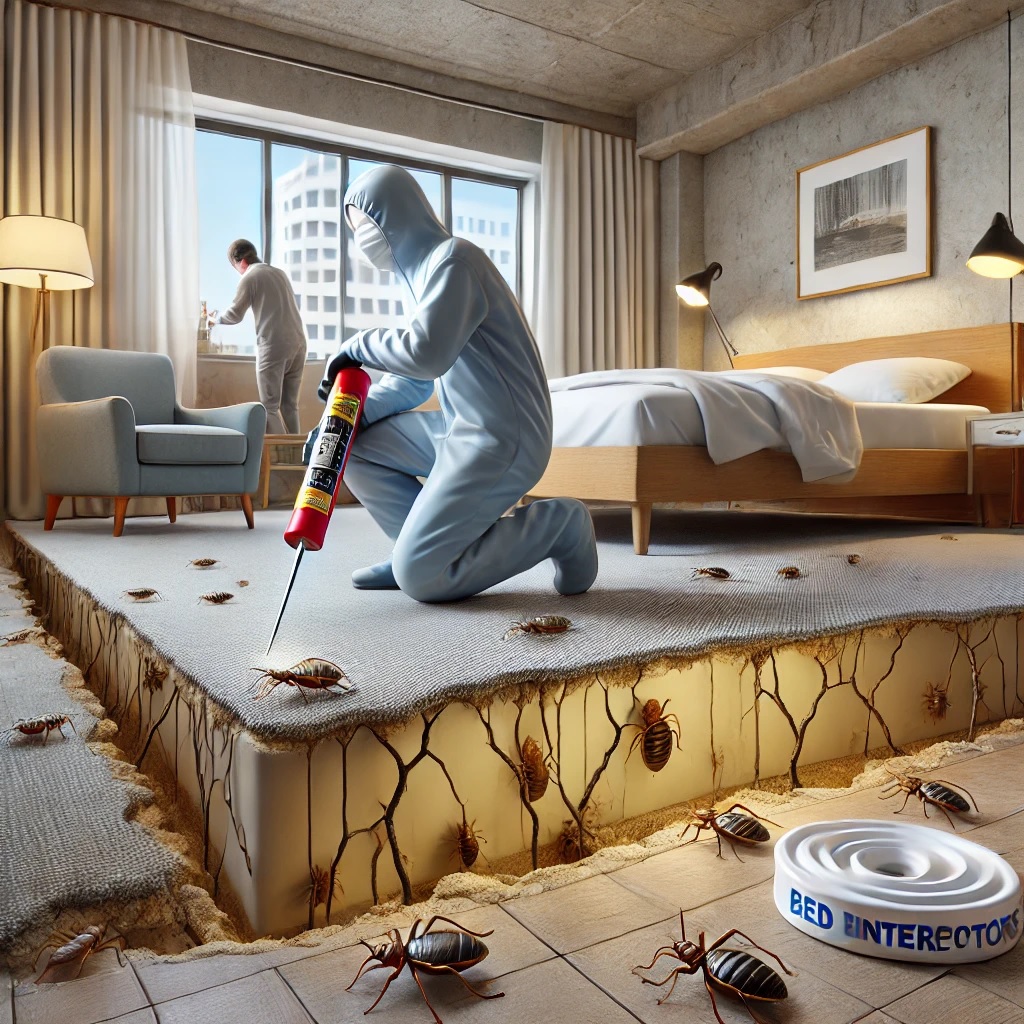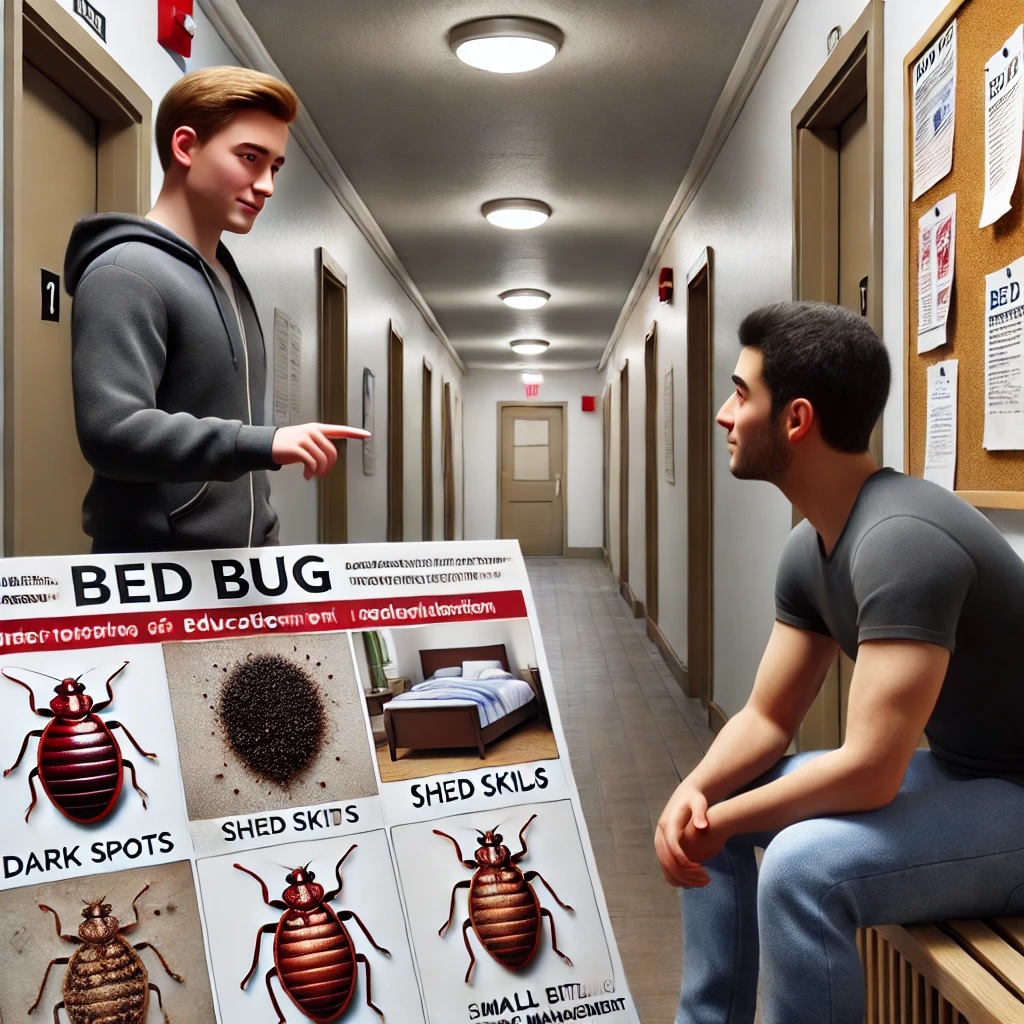If you’ve ever had the misfortune of dealing with bed bugs, you know how much of a headache they can be. But in an apartment building, the problem can get even worse—bed bugs don’t respect boundaries, and they’ll happily travel from one flat to the next. Whether you’re a landlord or a tenant, preventing a bed bug infestation is key to keeping your living environment clean and comfortable.
In this guide, we’ll walk through simple but effective strategies that landlords and tenants can use to stop bed bugs before they become a bigger problem.

Why Bed Bug Prevention is So Important in Apartment Buildings
Bed bugs spread easily in multi-unit buildings, and a small issue in one flat can quickly turn into a building-wide problem. These pests can crawl through walls, pipes, and electrical outlets, making it hard to contain them once they start moving. If you live in or manage an apartment block, prevention is the best defence.
For landlords, a bed bug infestation can lead to costly treatments and potentially unhappy tenants. For tenants, dealing with bed bugs can be stressful, uncomfortable, and disruptive. So, how do we stop these little pests from spreading? Let’s get into it.
How Bed Bugs Spread in Apartment Buildings
Bed bugs are sneaky, and they don’t need much space to travel. In apartment buildings, they move through small gaps in walls, plumbing, and even electrical outlets. But how do they get in, to begin with?
Common Sources of Bed Bug Infestations
- Second-hand furniture: That bargain sofa might seem like a great find, but second-hand furniture is one of the most common ways bed bugs make their way into homes. Learn more about how bed bugs spread.
- Travel: Ever stayed in a hotel or used public transport? You could unknowingly pick up bed bugs and bring them home in your luggage or clothes. Check out our bed bug prevention tips for travellers.
- Neighbours: If the unit next door has an infestation, bed bugs can easily crawl through shared walls, vents, or pipes and into your flat.
Understanding how bed bugs move helps you block off their access points. Now, let’s dive into some prevention tips.
Prevention Measures for Landlords
As a landlord, you have a responsibility to ensure your building is bed bug-free. Here’s how you can make sure your property stays protected.
1. Schedule Regular Inspections
Regular pest inspections are essential in apartment buildings, especially in common areas like hallways, laundry rooms, and lounges. It’s easier to catch a problem early than to deal with a full-blown infestation later. Consider using bed bug monitoring services or traps in high-risk areas to keep an eye out for any signs of bed bugs.
2. Educate Your Tenants
Many people don’t know how bed bugs spread or what to look out for. As a landlord, you can help by educating your tenants. Send out flyers, and emails, or host meetings to share prevention tips, such as how to inspect second-hand furniture or check for bed bugs after travelling. Encourage tenants to report any signs of bed bugs immediately. The sooner they let you know, the faster you can take action.
3. Use Protective Bed Bug Covers
If you provide furnished units, invest in mattress encasements that are designed to stop bed bugs. These covers zip around the entire mattress and make it impossible for bed bugs to get in or out. Even if you don’t offer furnished flats, you can recommend these covers to your tenants as a simple way to protect their beds.
4. Seal Entry Points
Bed bugs can slip through cracks in walls, floors, and around plumbing. Regular maintenance to seal these gaps can help prevent bed bugs from moving between units. Use caulk around baseboards, electrical outlets, and plumbing fixtures to block off their pathways.
5. Have a Pest Control Plan
Bed bug infestations can escalate quickly, so having a plan in place is crucial. Work with a trusted pest control company, likeThermoPes, to handle any issues swiftly and effectively. Set clear expectations with tenants about what they should do if they suspect bed bugs, and outline the steps you’ll take to treat infestations.
Prevention Tips for Tenants
Even if your landlord is doing their part, you can also take steps to protect your home from bed bugs. Here’s how to prevent bed bugs in your own space.
1. Inspect Second-Hand Furniture and Clothes
That second-hand wardrobe might look great, but bed bugs could be hiding inside. Before bringing any second-hand furniture into your flat, give it a thorough inspection. Check cracks, seams, and joints for any signs of bed bugs, like small black spots or shed skins. For second-hand clothing, throw it straight into the washing machine on a hot wash before wearing it or putting it in your wardrobe.
2. Take Precautions After Travelling
If you’ve been away, don’t drag your suitcase straight into the bedroom. Bed bugs love to hide in luggage, so inspect your bags carefully after returning from a trip. Wash all your clothes in a hot setting and consider vacuuming your suitcase inside and out. Learn more about bed bug travel prevention.
3. Keep Your Home Clutter-Free
Bed bugs thrive in clutter because it gives them more places to hide. Decluttering your flat not only keeps it tidy but also makes it easier to spot any signs of bed bugs before they become a serious problem. Vacuum regularly, especially around beds, sofas, and other upholstered furniture.
4. Use Bed Bug Interceptors
Bed bug interceptors are small devices you place under the legs of your bed. They trap any bed bugs that try to crawl up onto your mattress, giving you an early warning if there’s an issue. These traps are inexpensive and easy to use, making them a great preventative measure for tenants.
What to Do If You Suspect Bed Bugs
Even with the best prevention, bed bugs can sometimes sneak in. If you think you’ve spotted bed bugs in your flat, don’t wait—take action straight away.
1. Inspect Your Flat Thoroughly
Start by inspecting your bed, mattress, and furniture. Look for small dark spots, eggs, or shed skins. Bed bugs tend to hide in cracks and crevices, so check these areas carefully. Consider using bed bug detection services to confirm the infestation.
2. Report the Problem to Your Landlord
Let your landlord or property manager know as soon as possible if you think there’s a bed bug problem. The faster they respond, the easier it is to deal with the infestation. Be clear about where and when you first noticed the signs.
3. Professional Treatment is Key
DIY methods like sprays or traps might help a bit, but they rarely solve the problem entirely. Bed bugs are tough to get rid of, and professional pest control is usually the best option. At Thermopest, we use proven techniques to eliminate bed bugs and prevent them from coming back.
Long-Term Bed Bug Prevention
Once your building is bed bug-free, you’ll want to keep it that way. Here are some long-term strategies that can help both landlords and tenants stay vigilant.
1. Routine Inspections and Maintenance
Regular inspections aren’t just for catching current infestations—they’re also a great way to prevent future ones. Set up a schedule for pest control professionals to inspect both individual units and common areas.
2. Educating New Tenants
Prevention starts with knowledge. Make sure new tenants understand the risks of bed bugs and how to prevent them from entering their flats. This could be as simple as including a “bed bug prevention” leaflet with the lease agreement.
3. Keep Using Prevention Tools
Encourage tenants to keep using mattress covers, interceptors, and other bed bug prevention tools even after treatment. These products work well as a barrier and early detection method.

Final Thoughts: Stopping Bed Bugs in Their Tracks
Preventing bed bugs in apartment buildings takes a team effort between landlords and tenants. By staying proactive and working together, you can avoid the stress, hassle, and cost of a bed bug infestation.
AtThermoPes, we’re here to help with all your bed bug prevention and treatment needs. Whether you’re dealing with an existing problem or just want advice on keeping your building bed bug-free, get in touch with us today. Together, we’ll make sure those pesky pests stay far away from your home!

